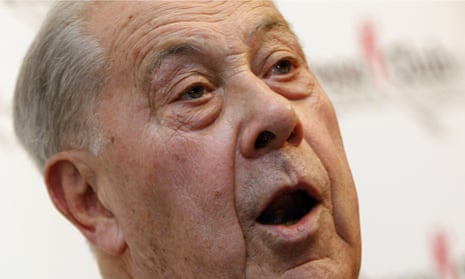The former French interior minister Charles Pasqua, who has died aged 88, was a totem of the French right, influential in shaping its hardline policies for more than 30 years. A resistance fighter turned henchman for General Charles de Gaulle and the power broker behind two centre-right presidents – Jacques Chirac and Nicolas Sarkozy – Pasqua was best known for his tough stances on immigration, terrorism and crime.
Both the man, a blunt-speaking bruiser, and his views, based on virulent nationalism, polarised people. His devotion to his country was without question, but his deeply ingrained social conservatism and a series of allegations of pocketing public money and misuse of power earned him the nickname “the Godfather of the Hauts-de-Seine”, the area in the western suburbs of Paris where he lived and held court.
To the right, the former drinks salesman with his strong southern accent was a refreshing change from the graduates of the grandes écoles who formed the overwhelming majority of France’s ruling elite. The left found his flirting with policies championed by the far-right Front National, including calls for “zero immigration”, and his paternalistic, authoritarian approach too hard to swallow.
He belonged to the generation of politicians who set the rightwing agenda that has persisted to the current day. Pasqua has been credited with many of the tough policies and the rhetoric of Sarkozy, currently leader of the opposition Republicans party (formerly the UMP), to whom he was a mentor.
In a career that swerved in and out of the political and legal shadows, Pasqua occasionally gave the impression he believed himself accountable to no one, roundly batting away allegations of criminal activity, at least one of which led to a suspended prison sentence. It was an impression that Pasqua, with his hangdog jowls, cultivated with soundbite quotes. “Democracy ends where the interests of the state begin,” he once declared. “We have to terrorise the terrorists.” “Promises are binding only on those who believe them.”
The last of these would come back to bite him, as even close friends betrayed their promises, ensuring that for all his influence, bluster and larger than life presence, Pasqua would never make it to the very top of the French political ladder. Even his spell in government – he was interior minister from 1986 to 1988 and again from 1993 to 1995 – was brief.
Pasqua was born in Grasse, Provence. His grandfather was a Corsican shepherd and his parents were migrants to the French mainland. Pasqua’s father, André, worked as a police officer and was a member of the resistance, and his mother, Françoise (nee Rinaldi), worked in the local perfume industry.
Pasqua left school at 15, joined the resistance and obtained a law degree, before taking a job selling pastis with the drinks company Ricard, where he rose to become the company number two.
As De Gaulle rode out the domestic turbulence caused by his opposition to, then support for, Algerian independence, Pasqua helped create the Service d’Action Civique (SAC), a shadowy Gaullist militia known for its violent methods. During the May 1968 student riots, he controversially used the SAC to mobilise a “patriotic” counter-demonstration to prop up De Gaulle’s authority.
After helping Chirac to become prime minister in 1986, he was named interior minister despite the opposition of the then Socialist president François Mitterrand, who described Pasqua as “that devil”. He led an unsuccessful revolt against the 1992 Maastricht treaty, which introduced the euro, and in 1999 entered the European parliament as leader of his own anti-EU party, the Rassemblement pour la France.
Disillusioned with Chirac, Pasqua backed his rival Edouard Balladur in the 1995 presidential election. When Chirac won, Pasqua entered a political desert from which he never fully emerged, despite the growing influence of his young protege Sarkozy.
Among Pasqua’s legal entanglements was a 2009 conviction – later overturned – for allegedly arranging the sales of weapons during the Angolan civil war in the 1990s contrary to a UN arms embargo, and an accusation, vehemently denied, that he profited from the UN’s oil-for-food programme in Iraq. He never spent a day in jail.
When he died suddenly, of a heart attack, he was still challenging a two-year suspended sentence for misappropriation of public funds.
Sarkozy said France had lost one of its “most dedicated public servants ... He embodied a certain idea of politics and France, built on engagement, courage and convictions.”
Pasqua remained a Gaullist to the core: from 2004 to 2011 he sat in the UMP group in the senate. In a statement, his family said: “To him, politics was a battle in the service of France, with the loyalty of partners, with the respect of his opponents when they were driven, like him, by conviction and courage.”
Pasqua is survived by his wife, Jeanne (nee Joly). The couple’s only child, Pierre-Philippe, died in February.

Comments (…)
Sign in or create your Guardian account to join the discussion